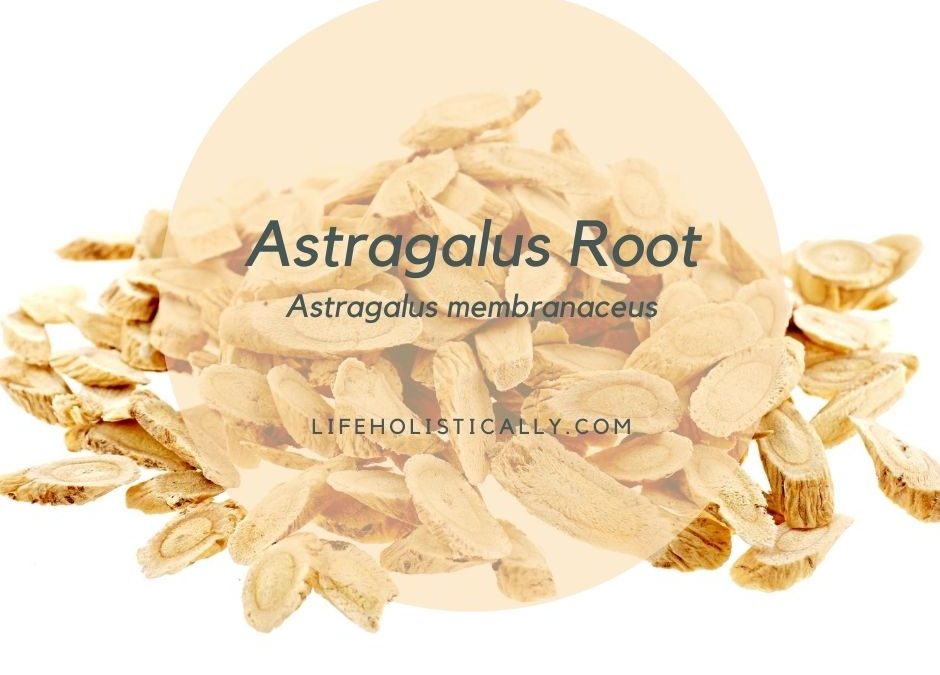My essential oil education fueled my passion for the botanical world…and has blossomed over the last decade into honoring and utilizing the entire plant, not just the volatile oil. Herbs are much more sustainable than the oil itself, contain more therapeutic properties such as vitamins and minerals, and can be taken internally quite safely, which is something that does not continuously crossover to essential oils. Herein lies my passion for our well-being. I am all for advocating for my health and my family, so I am writing this herbal spotlight on Astragalus to share with you today. The more nutrition we can get into our days, the better. What is so special about astragalus Astragalus membranaceus? How can we use Astragalus root for immune system support and respiratory ailments?
This root has been used for centuries in traditional Chinese medicine (1). There are over 2,000 plant species, which is mind-blowing, but typically, only two are used in complementary medicine. There are many forms of medicine to consume because they are that valuable.
The primary organs they affect are the spleen and the lungs, and here is how that applies to us when we consume it.
Anti-Inflammatory Properties
The thing that drew me to the plant is its anti-inflammatory properties. We know that inflammation is a naturally occurring thing after obtaining bodily injury, but there is much more to it than that. The stress of the modern world, the way we eat, how much sleep we get, and a whole host of other factors determine the level of inflammation in our bodies. The more inflammation we have, the more health risks we accumulate. Inflammation even fights viruses and bacteria! Not all bad, right? Internal inflammation can also cause cancer, so it is essential to understand when it is beneficial, just like stress (2).
According to a study published in 2018, “the inhibition of COX-2 expression by Astragalus membranaceus extract indicated that the extract positively modulated the arachidonic acid cascade during inflammation, thus significantly contributing to its anti-inflammatory effects (3).”
COX-2 is an enzyme responsible for inflammation and pain. In laments terms, the above study targeted inflammation reduction in the intestinal lining using the herbal extract. Consider dysbiosis, IBS, leaky gut, or a permeable intestinal lining.
Astragalus can target inflammation all over the body and is classified as an immunomodulator (4). Immunomodulators balance, regulate, and strengthen the immune system and its response. The polysaccharides play a part in regulating inflammation and the immune system, similar to the polysaccharides in turmeric curcumin longa.
Lung Tonic
The anti-inflammatory properties of Astragalus cross over into our lungs as well, typically called a lung tonic. When we look at the shifting of seasons in the Northern Hemisphere and the beginning of autumn, we are acclimating to an increase in mucous production due to the cooler weather and mold spores from fallen leaves, etc. Many individuals can attest to respiratory issues and illnesses with the onset of autumn. Not only can astragalus address excess mucous production, but it is incredibly beneficial for the dry irritation of winter and air contaminants.
Astragalus stimulated macrophage activity by stimulating levels of cytokines without stimulating a cytokine storm (5). In laments terms, taking astragalus is a powerful ally to our immune system by increasing white blood cells to address a possible infection. It is indicated for colds, influenza, and other respiratory ailments.
Cautions and Contraindications
Astragalus is cautioned for those who have moderate autoimmune conditions and those with acute infections(6). While some consider Astragulus an immune modulator, others consider it an immune stimulant; therefore, Astragalus should be avoided if taking medications intended to suppress the immune system.
Method of Delivery
Astragalus can be taken in many forms, including an herbal tincture and a decoction (boiled and simmered), which is helpful for fibrous material, roots, rhizomes, or in capsule form. I add astragalus root to my elderberry syrup blend, and as we move into the cooler months, soaking astragalus root into a soup or bone broth is nutritious and delicious.
Astragalus root can be a beneficial ally for immune system support and, particularly for respiratory ailments. I hope you consider adding it to your wellness arsenal as you prepare for autumn and winter.
xo Leslie
For additional reading on herbs supporting your immune system, click here.
References
(1) Liu, P., Zhao, H., & Luo, Y. (2017). Anti-Aging Implications of Astragalus Membranaceus (Huangqi): A Well-Known Chinese Tonic. Aging and Disease, 8(6), 868. doi:10.14336/ad.2017.0816
(2) Publishing, H. (n.d.). Understanding Inflammation. Retrieved August 19, 2020, from https://www.health.harvard.edu/staying-healthy/understanding-inflammation
(3) Adesso, S., Russo, R., Quaroni, A., Autore, G., & Marzocco, S. (2018). Astragalus membranaceus Extract Attenuates Inflammation and Oxidative Stress in Intestinal Epithelial Cells via NF-κB Activation and Nrf2 Response. International Journal of Molecular Sciences, 19(3), 800. doi:10.3390/ijms19030800
(4) Jin, M., Zhao, K., Huang, Q., & Shang, P. (2014). Structural features and biological activities of the polysaccharides from Astragalus membranaceus. International Journal of Biological Macromolecules, 64, 257-266. doi:10.1016/j.ijbiomac.2013.12.002
(5) Lee, K. Y., & Jeon, Y. J. (2005). Macrophage activation by polysaccharide isolated from Astragalus membranaceus. International Immunopharmacology, 5(7-8), 1225-1233. doi:10.1016/j.intimp.2005.02.020
(6) Hoffmann, D. (1993). An elders’ herbal. Rochester, VT: Healing Arts Press




